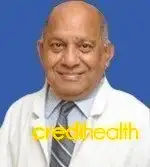Hiccups, also known as synchronous diaphragmatic flutter, are involuntary contractions of the diaphragm muscle, causing a sudden intake of breath that is cut off by the vocal cords, producing a "hic" sound. Hiccups can be caused by a variety of factors, such as eating too quickly, drinking carbonated beverages, or certain medical conditions. Hiccups usually go away on their own within a few minutes or hours, but persistent hiccups may require medical treatment.
| Causes | Gastrointestinal disorders, Neurological disorders, Metabolic disorders |
|---|---|
| Remedies | Drinking water, Gargling with ice water, Holding your breath |
| Preventive Options | Slow Down Eating and Drinking, Practice Deep Breathing Techniques, Manage Stress and Anxiety |
| Treatment Options | Baclofen, Chlorpromazine, Diaphragmatic Pacing |
| Specialist | ENT Specialist |
Hiccups are a common symptom that occur when the diaphragm, a muscle located between the chest and abdomen, contracts involuntarily, causing the vocal cords to close and resulting in a "hic" sound. Hiccups can be caused by various factors such as eating too quickly, swallowing air, consuming carbonated drinks, or eating spicy foods. They can also be a side effect of certain medications, or a symptom of underlying medical conditions such as gastroesophageal reflux disease (GERD), kidney failure, or nerve damage. In most cases, hiccups are harmless and will resolve on their own within a few minutes to a few hours. However, persistent or chronic hiccups may require medical attention and treatment options may include medication or even surgery in rare cases.
Hiccups are involuntary contractions of the diaphragm muscle that can occur for various reasons, and may be accompanied by other symptoms such as:
Hiccups are a common reflex action that occurs when the diaphragm contracts suddenly, causing the vocal cords to close, which produces a "hic" sound. Here are some types of hiccups:
| Types of Hiccups | Description |
| Acute hiccups | Hiccups that last for less than 48 hours and are often caused by overeating, drinking carbonated beverages, or sudden excitement or stress. |
| Persistent hiccups | Hiccups that last for longer than 48 hours and can be caused by a variety of medical conditions, such as gastroesophageal reflux disease (GERD), nerve damage, or kidney failure. |
| Refractory hiccups | Hiccups that last for more than a month and are difficult to treat. |
| Synchronous diaphragmatic flutter | A rare condition that causes the diaphragm to contract rapidly and repeatedly, producing hiccups and a visible twitching of the abdomen. |
| Singultus | The medical term for hiccups, which comes from the Latin word for "to catch one's breath." |
Hiccups are a common phenomenon, and most of the time, they do not indicate any serious medical condition. However, persistent hiccups that last for more than 48 hours may be a sign of an underlying medical condition. Here are some medical conditions that can cause hiccups
Hiccups can be caused by gastrointestinal disorders such as gastroesophageal reflux disease (GERD), inflammatory bowel disease (IBD), and peptic ulcers. These conditions can cause irritation to the diaphragm and the phrenic nerve, which can trigger hiccups.
Neurological disorders such as stroke, brain tumors, meningitis, and multiple sclerosis can cause hiccups. These conditions can affect the functioning of the brainstem, which controls the breathing process and can lead to hiccups.
Hiccups can also be a sign of metabolic disorders such as diabetes, hyperthyroidism, and hypoglycemia. These conditions can cause an imbalance in the body's chemical composition, leading to hiccups.
Certain medications such as steroids, barbiturates, and opioids can cause hiccups as a side effect.
Psychological conditions such as anxiety, stress, and excitement can also cause hiccups. These emotions can stimulate the sympathetic nervous system, which can cause the diaphragm to contract and lead to hiccups.
In rare cases, hiccups can be a sign of cancer. Tumors in the chest or abdomen can cause irritation to the diaphragm, leading to hiccups.
There is no single diagnostic test for hiccups, as the appropriate tests will depend on the underlying cause of the symptom. However, your doctor may perform some of the following tests or procedures to help diagnose the cause:
Hiccups, also known as synchronous diaphragmatic flutter (SDF), are involuntary contractions of the diaphragm muscle. While they usually resolve on their own, persistent hiccups can be bothersome and may indicate an underlying medical condition. Here are five drugs used in the treatment of hiccups
Chlorpromazine is an antipsychotic medication that can also be used to treat hiccups. It works by blocking dopamine receptors in the brain and reducing the contractions of the diaphragm.
Baclofen is a muscle relaxant that can be used to treat hiccups. It works by suppressing the activity of the nerve cells that control muscle contractions in the diaphragm.
Metoclopramide is a medication used to treat gastrointestinal disorders, such as nausea and vomiting. It can also be used to treat hiccups by blocking dopamine receptors in the brain and reducing diaphragm contractions.
Gabapentin is a medication used to treat seizures and neuropathic pain. It has also been found to be effective in treating persistent hiccups by reducing the sensitivity of the nerve cells in the diaphragm.
Nifedipine is a medication used to treat high blood pressure and angina. It can also be used to treat hiccups by relaxing the smooth muscle of the diaphragm.
In rare cases, hiccups may persist for an extended period of time and become chronic. In such cases, surgery may be considered as a last resort option to treat hiccups. The following are some surgical procedures that can be used to treat chronic hiccups
In this surgical procedure, electrodes are implanted in the diaphragm muscle, which helps regulate the contraction of the muscle and can stop the hiccups.
In this procedure, electrodes are implanted on the phrenic nerve that controls the diaphragm muscle. The electrodes deliver electrical impulses to the nerve, which can help control the contractions of the diaphragm and stop hiccups.
There are several home remedies that can be tried to alleviate hiccups. Some of the most effective home remedies for hiccups include
This is a common home remedy for hiccups that involves taking a deep breath and holding it for as long as possible. This can help regulate the breathing pattern and can stop the hiccups.
Drinking a glass of water can help relax the diaphragm muscle and stop hiccups.
Gargling with ice water can help stimulate the nerves that control the diaphragm muscle and can stop hiccups.
Breathing into a paper bag can help regulate the breathing pattern and can stop hiccups.
Swallowing a spoonful of sugar can help stimulate the vagus nerve, which can help stop hiccups.
Hiccups are often harmless and can go away on their own, but they can also be uncomfortable and even painful if they persist for an extended period. Fortunately, there are several ways to prevent hiccups from occurring or to alleviate them when they do occur. Here are some ways of prevention of hiccups in detail.
Eating or drinking too quickly can cause air to get trapped in the stomach and trigger hiccups. Therefore, it is essential to slow down and take small bites or sips. Drinking through a straw can also cause air to get into the stomach, so avoiding straws can be beneficial.
Overeating or drinking too much can also lead to hiccups. It is recommended to avoid consuming large meals or beverages, especially those that are carbonated, spicy, or hot. Drinking cold water can be helpful in calming the diaphragm muscle and preventing hiccups.
Deep breathing techniques can help relax the diaphragm and prevent hiccups. Slowly inhaling and exhaling, holding the breath for a few seconds, and then releasing can be an effective way to prevent hiccups. Yoga and meditation practices can also be beneficial.
Stress and anxiety can cause hiccups as they can lead to rapid breathing and shallow breathing. It is important to manage stress and anxiety through activities like exercise, meditation, or talking to a mental health professional. Reducing stress can also help to prevent hiccups.
Certain irritants, like cigarette smoke or strong smells, can trigger hiccups. Avoiding these irritants or minimizing exposure to them can be an effective way to prevent hiccups.
If hiccups persist or become painful, medication may be necessary. There are several over-the-counter and prescription medications that can help prevent or alleviate hiccups, including chlorpromazine and metoclopramide.
Hiccups are a common symptom that can be caused by a variety of factors, such as eating too quickly, drinking carbonated beverages, or underlying medical conditions. While it may be a temporary and harmless sensation in some cases, there are certain warning signs and symptoms that may indicate a more serious underlying condition. It is important to be aware of these signs and symptoms in order to determine when medical attention is necessary.
Here are some warning signs and symptoms that may indicate a more serious condition and warrant a visit to a doctor if you have hiccups:
If you are experiencing any of these symptoms in addition to hiccups, it is important to seek medical attention right away. These symptoms may indicate a serious underlying condition, such as gastroesophageal reflux disease (GERD), pneumonia, or nerve damage. In some cases, prompt medical treatment can be life-saving.
If you have hiccups and are concerned about your health, it is important to seek immediate medical attention from a qualified hiccups doctor. A doctor specializing in treating hiccups, such as a ENT Specialist, would be the right health professional to consult.
Here is a list of Top verified doctors for hiccups. You can book an appointment with one to start your hiccups treatment today.

Manipal Hospitals, Dhakuria, Kolkata
Rs. 1,000 Consult Fees

Max Super Speciality Hospital, Shalimar Bagh, Delhi NCR
Rs. 800 Consult Fees

Jaslok Hospital, Mumbai
Rs. 1,500 Consult Fees
A hospital can provide various services to help diagnose and treat your hiccups. If you are experiencing hiccups In that case, it is important to visit a hiccups hospital for a proper diagnosis and treatment plan.
Check a list of Top Hospitals for hiccups treatment.
Multi Speciality Hospital
Established in 1918
🛌345 Beds
.png)
Multi Speciality Hospital
Established in 1940
🛌220 Beds

Multi Speciality Hospital
Established in 1947
🛌230 Beds
Frequently asked questions and answers about hiccups.
How do I stop my hiccups?
To stop hiccups, you can try holding your breath, drinking water, or swallowing sugar.
What are 3 causes of hiccups?
The three common causes of hiccups are eating or drinking too quickly, swallowing air, and emotional stress.
How long should a hiccup last?
Typically, a hiccup episode lasts for a few minutes, but in some cases, it can persist for several hours or even days.
Reviews by patients on different.
K .Parsad
Manipal Hospital
Dr. Anuj Goel has been a wonderful experience for me. He is a cheerful, lively, and upbeat individual. He provides us with actual, actionable, and concrete solutions to our situation. I am quite comfortable discussing any topic connected to life with you. Both mam and sir are the most nicest people I've ever encountered. I am completely satisfied.
Shikha Jain
CARE Hospital
Dr. has been a wonderful experience for me. He is a cheerful, lively, and upbeat individual. He provides us with actual, actionable, and concrete solutions to our situation. I am quite comfortable discussing any topic connected to life with you. Both mam and sir are the most nicest people I've ever encountered. I am completely satisfied.
P.Harshith Rao
Manipal Hospital
My time with Dr. has been excellent. He is a cheerful, lively, and upbeat individual. He provides us with actual, actionable, and concrete solutions to our situation. I am quite comfortable discussing any topic connected to life with you. Both mam and sir are the most nicest people I've ever encountered. I am completely satisfied.
Credihealth is an online healthcare portal for all your hospital appointments, diagnostic test bookings, ordering medications, or homecare services. If you have any inquiries, our in-house medical experts can help solve them and guide you to the best specialist in the India.